Employment Law Assignment - [University Name] - [Course Name]
VerifiedAdded on 2023/01/16
|7
|1109
|78
Homework Assignment
AI Summary
This assignment analyzes three key employment law scenarios in Ontario. The first case examines whether an employee, Regina, is bound by the terms of an employee policy manual provided on her first day of work, particularly regarding termination without notice. The second case explores a situation where an employer refuses to hire Jethro, a recovering cocaine addict, for a safety-sensitive position, and the legal implications under the Ontario Human Rights Code. The final scenario considers whether the legislature of New Brunswick can restrict individuals from other provinces from working in the New Brunswick fishing industry, analyzing the constitutionality of such a restriction under the Canadian Constitution. The assignment provides detailed legal arguments, referencing relevant legislation and case law, to determine the likely outcomes of each case.
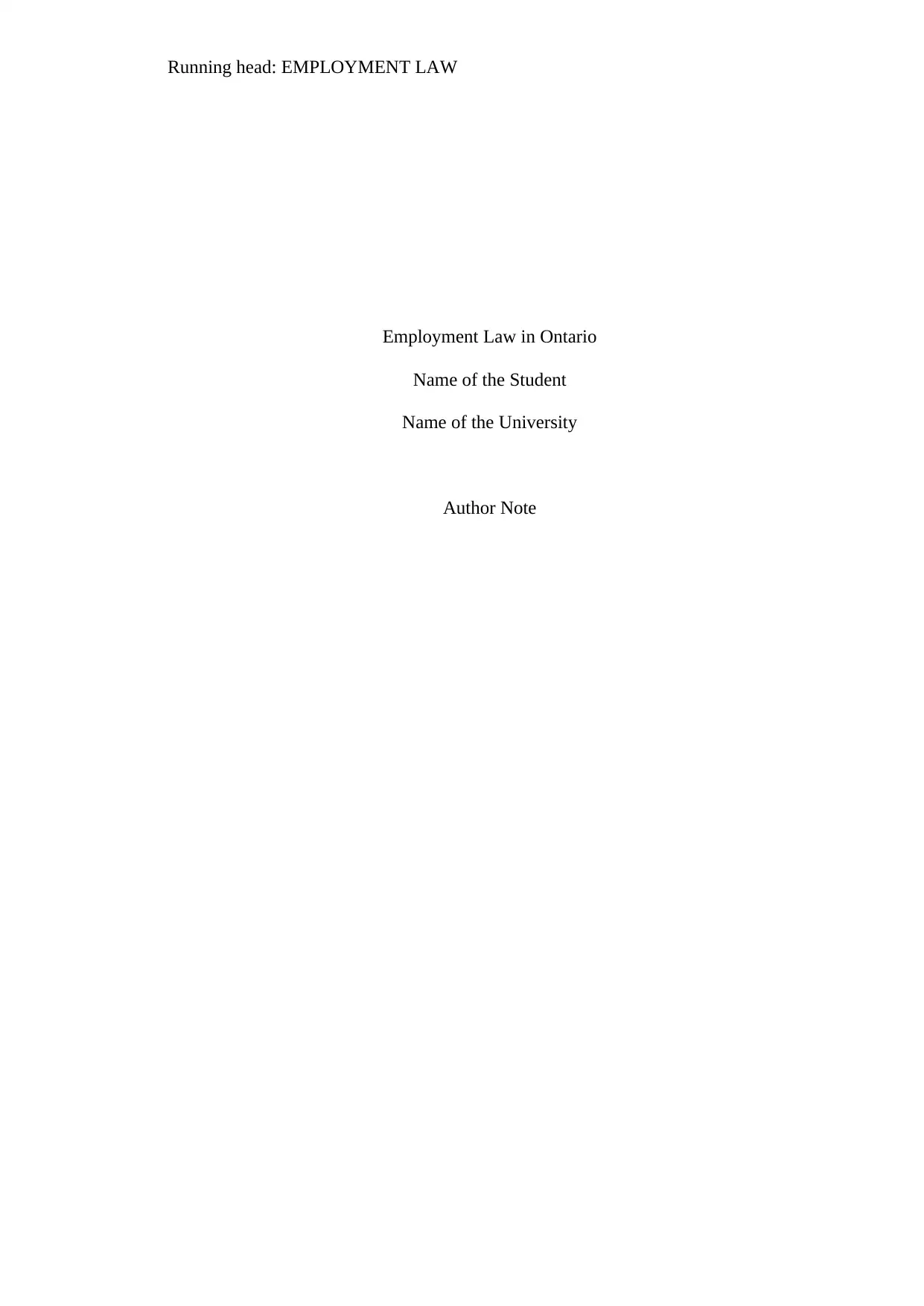
Running head: EMPLOYMENT LAW
Employment Law in Ontario
Name of the Student
Name of the University
Author Note
Employment Law in Ontario
Name of the Student
Name of the University
Author Note
Paraphrase This Document
Need a fresh take? Get an instant paraphrase of this document with our AI Paraphraser

1EMPLOYMENT LAW
Table of Contents
Answer 1........................................................................................................................2
Answer 2........................................................................................................................3
Answer 3........................................................................................................................4
References......................................................................................................................6
Table of Contents
Answer 1........................................................................................................................2
Answer 2........................................................................................................................3
Answer 3........................................................................................................................4
References......................................................................................................................6
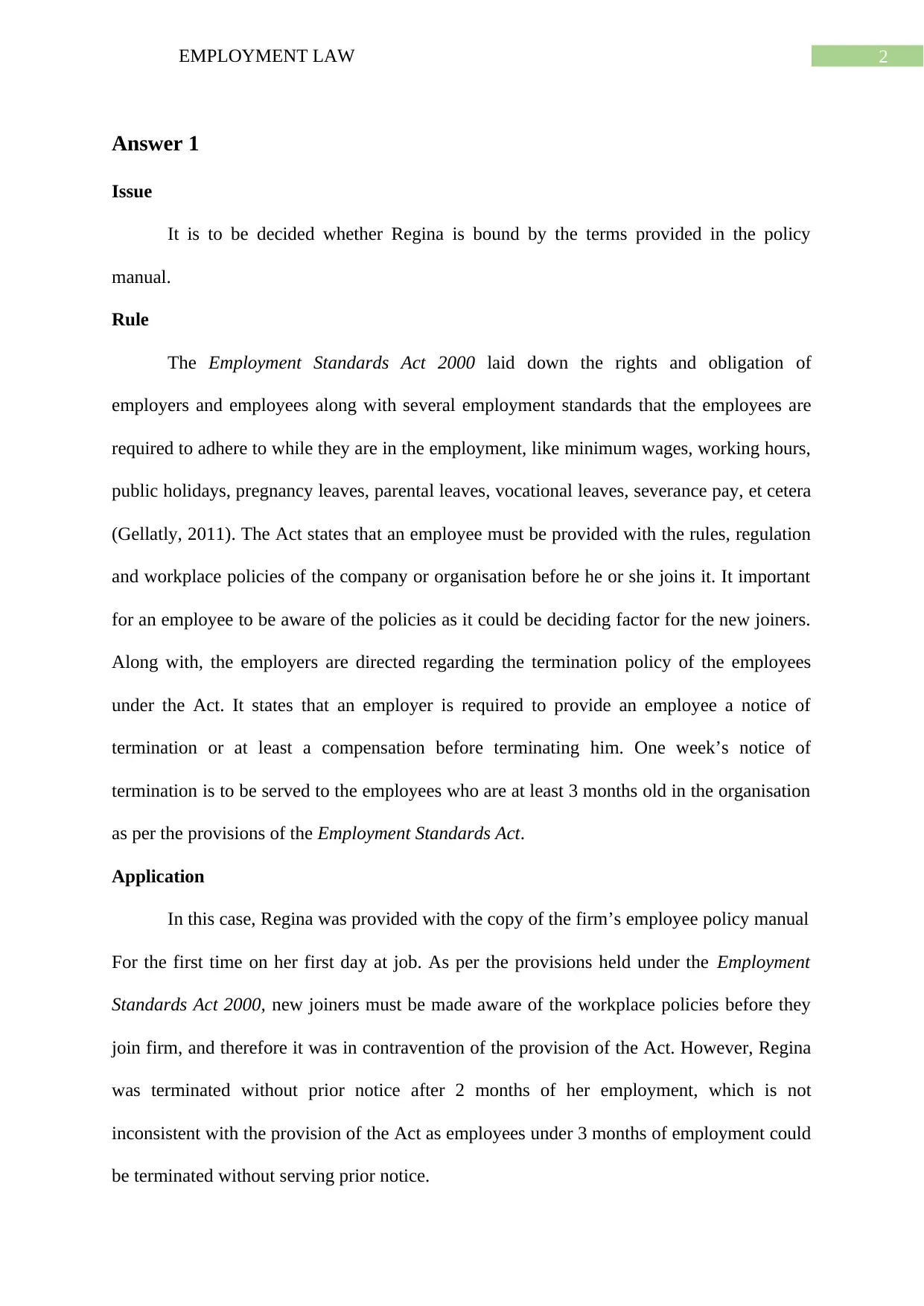
2EMPLOYMENT LAW
Answer 1
Issue
It is to be decided whether Regina is bound by the terms provided in the policy
manual.
Rule
The Employment Standards Act 2000 laid down the rights and obligation of
employers and employees along with several employment standards that the employees are
required to adhere to while they are in the employment, like minimum wages, working hours,
public holidays, pregnancy leaves, parental leaves, vocational leaves, severance pay, et cetera
(Gellatly, 2011). The Act states that an employee must be provided with the rules, regulation
and workplace policies of the company or organisation before he or she joins it. It important
for an employee to be aware of the policies as it could be deciding factor for the new joiners.
Along with, the employers are directed regarding the termination policy of the employees
under the Act. It states that an employer is required to provide an employee a notice of
termination or at least a compensation before terminating him. One week’s notice of
termination is to be served to the employees who are at least 3 months old in the organisation
as per the provisions of the Employment Standards Act.
Application
In this case, Regina was provided with the copy of the firm’s employee policy manual
For the first time on her first day at job. As per the provisions held under the Employment
Standards Act 2000, new joiners must be made aware of the workplace policies before they
join firm, and therefore it was in contravention of the provision of the Act. However, Regina
was terminated without prior notice after 2 months of her employment, which is not
inconsistent with the provision of the Act as employees under 3 months of employment could
be terminated without serving prior notice.
Answer 1
Issue
It is to be decided whether Regina is bound by the terms provided in the policy
manual.
Rule
The Employment Standards Act 2000 laid down the rights and obligation of
employers and employees along with several employment standards that the employees are
required to adhere to while they are in the employment, like minimum wages, working hours,
public holidays, pregnancy leaves, parental leaves, vocational leaves, severance pay, et cetera
(Gellatly, 2011). The Act states that an employee must be provided with the rules, regulation
and workplace policies of the company or organisation before he or she joins it. It important
for an employee to be aware of the policies as it could be deciding factor for the new joiners.
Along with, the employers are directed regarding the termination policy of the employees
under the Act. It states that an employer is required to provide an employee a notice of
termination or at least a compensation before terminating him. One week’s notice of
termination is to be served to the employees who are at least 3 months old in the organisation
as per the provisions of the Employment Standards Act.
Application
In this case, Regina was provided with the copy of the firm’s employee policy manual
For the first time on her first day at job. As per the provisions held under the Employment
Standards Act 2000, new joiners must be made aware of the workplace policies before they
join firm, and therefore it was in contravention of the provision of the Act. However, Regina
was terminated without prior notice after 2 months of her employment, which is not
inconsistent with the provision of the Act as employees under 3 months of employment could
be terminated without serving prior notice.
⊘ This is a preview!⊘
Do you want full access?
Subscribe today to unlock all pages.

Trusted by 1+ million students worldwide
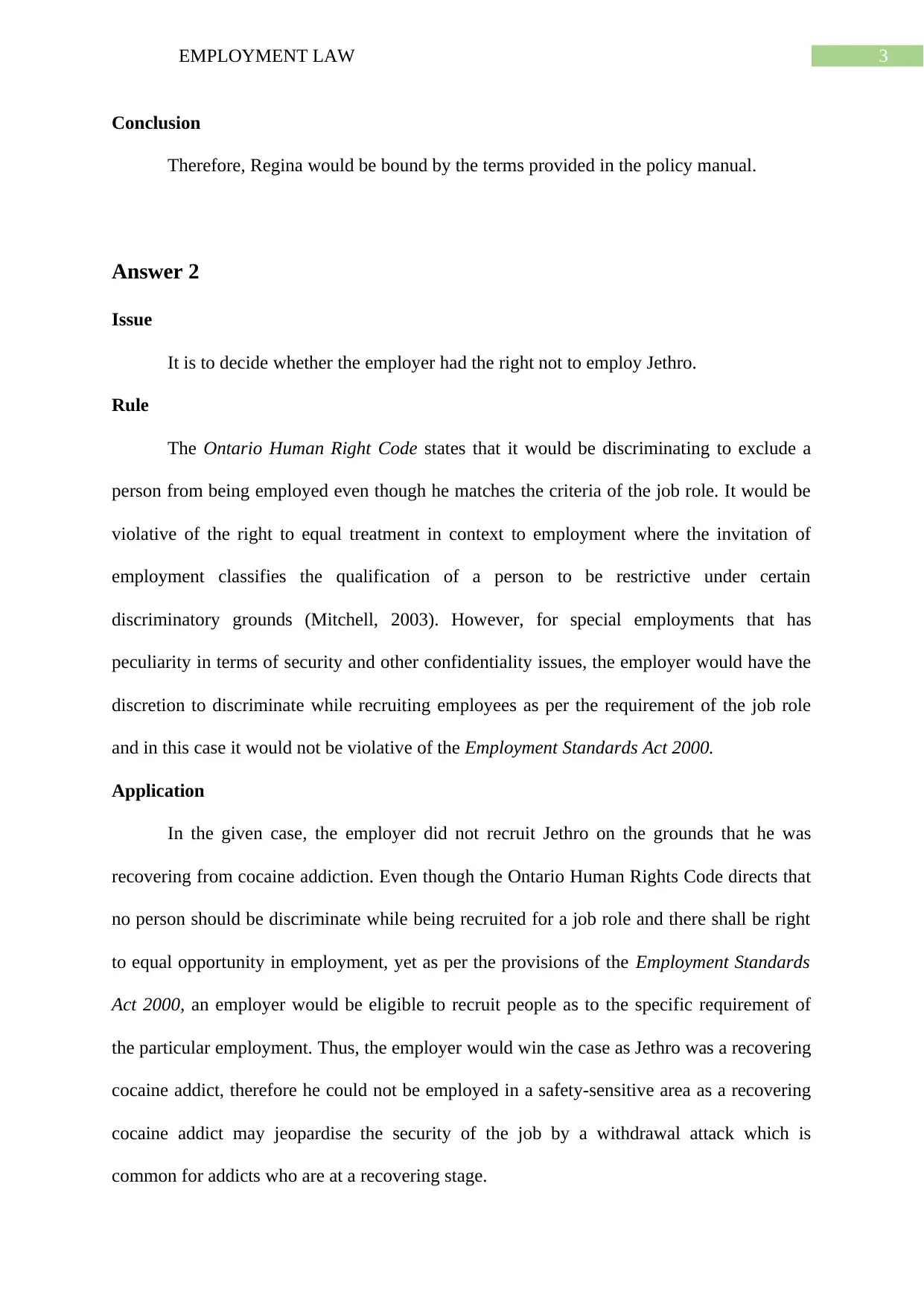
3EMPLOYMENT LAW
Conclusion
Therefore, Regina would be bound by the terms provided in the policy manual.
Answer 2
Issue
It is to decide whether the employer had the right not to employ Jethro.
Rule
The Ontario Human Right Code states that it would be discriminating to exclude a
person from being employed even though he matches the criteria of the job role. It would be
violative of the right to equal treatment in context to employment where the invitation of
employment classifies the qualification of a person to be restrictive under certain
discriminatory grounds (Mitchell, 2003). However, for special employments that has
peculiarity in terms of security and other confidentiality issues, the employer would have the
discretion to discriminate while recruiting employees as per the requirement of the job role
and in this case it would not be violative of the Employment Standards Act 2000.
Application
In the given case, the employer did not recruit Jethro on the grounds that he was
recovering from cocaine addiction. Even though the Ontario Human Rights Code directs that
no person should be discriminate while being recruited for a job role and there shall be right
to equal opportunity in employment, yet as per the provisions of the Employment Standards
Act 2000, an employer would be eligible to recruit people as to the specific requirement of
the particular employment. Thus, the employer would win the case as Jethro was a recovering
cocaine addict, therefore he could not be employed in a safety-sensitive area as a recovering
cocaine addict may jeopardise the security of the job by a withdrawal attack which is
common for addicts who are at a recovering stage.
Conclusion
Therefore, Regina would be bound by the terms provided in the policy manual.
Answer 2
Issue
It is to decide whether the employer had the right not to employ Jethro.
Rule
The Ontario Human Right Code states that it would be discriminating to exclude a
person from being employed even though he matches the criteria of the job role. It would be
violative of the right to equal treatment in context to employment where the invitation of
employment classifies the qualification of a person to be restrictive under certain
discriminatory grounds (Mitchell, 2003). However, for special employments that has
peculiarity in terms of security and other confidentiality issues, the employer would have the
discretion to discriminate while recruiting employees as per the requirement of the job role
and in this case it would not be violative of the Employment Standards Act 2000.
Application
In the given case, the employer did not recruit Jethro on the grounds that he was
recovering from cocaine addiction. Even though the Ontario Human Rights Code directs that
no person should be discriminate while being recruited for a job role and there shall be right
to equal opportunity in employment, yet as per the provisions of the Employment Standards
Act 2000, an employer would be eligible to recruit people as to the specific requirement of
the particular employment. Thus, the employer would win the case as Jethro was a recovering
cocaine addict, therefore he could not be employed in a safety-sensitive area as a recovering
cocaine addict may jeopardise the security of the job by a withdrawal attack which is
common for addicts who are at a recovering stage.
Paraphrase This Document
Need a fresh take? Get an instant paraphrase of this document with our AI Paraphraser
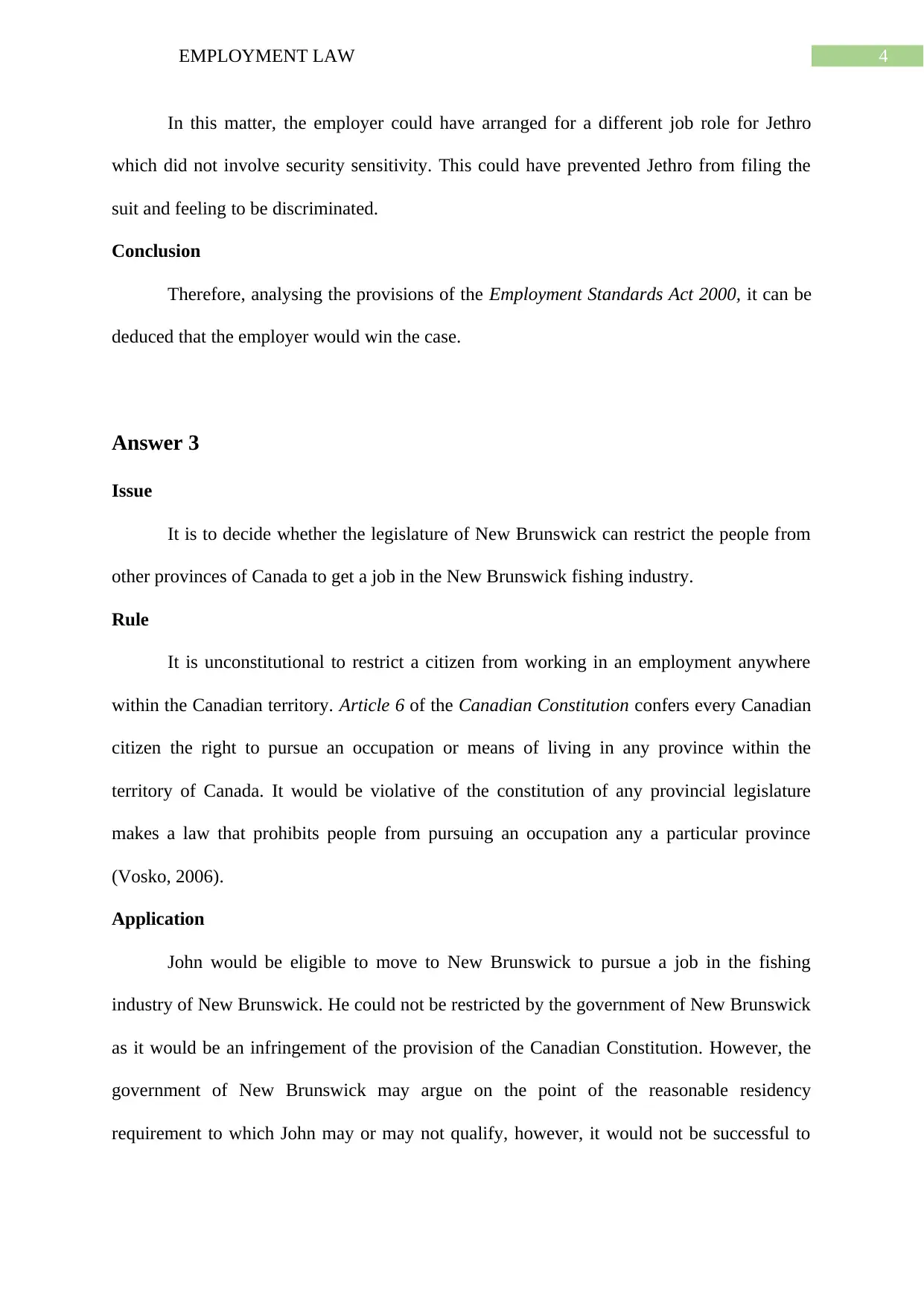
4EMPLOYMENT LAW
In this matter, the employer could have arranged for a different job role for Jethro
which did not involve security sensitivity. This could have prevented Jethro from filing the
suit and feeling to be discriminated.
Conclusion
Therefore, analysing the provisions of the Employment Standards Act 2000, it can be
deduced that the employer would win the case.
Answer 3
Issue
It is to decide whether the legislature of New Brunswick can restrict the people from
other provinces of Canada to get a job in the New Brunswick fishing industry.
Rule
It is unconstitutional to restrict a citizen from working in an employment anywhere
within the Canadian territory. Article 6 of the Canadian Constitution confers every Canadian
citizen the right to pursue an occupation or means of living in any province within the
territory of Canada. It would be violative of the constitution of any provincial legislature
makes a law that prohibits people from pursuing an occupation any a particular province
(Vosko, 2006).
Application
John would be eligible to move to New Brunswick to pursue a job in the fishing
industry of New Brunswick. He could not be restricted by the government of New Brunswick
as it would be an infringement of the provision of the Canadian Constitution. However, the
government of New Brunswick may argue on the point of the reasonable residency
requirement to which John may or may not qualify, however, it would not be successful to
In this matter, the employer could have arranged for a different job role for Jethro
which did not involve security sensitivity. This could have prevented Jethro from filing the
suit and feeling to be discriminated.
Conclusion
Therefore, analysing the provisions of the Employment Standards Act 2000, it can be
deduced that the employer would win the case.
Answer 3
Issue
It is to decide whether the legislature of New Brunswick can restrict the people from
other provinces of Canada to get a job in the New Brunswick fishing industry.
Rule
It is unconstitutional to restrict a citizen from working in an employment anywhere
within the Canadian territory. Article 6 of the Canadian Constitution confers every Canadian
citizen the right to pursue an occupation or means of living in any province within the
territory of Canada. It would be violative of the constitution of any provincial legislature
makes a law that prohibits people from pursuing an occupation any a particular province
(Vosko, 2006).
Application
John would be eligible to move to New Brunswick to pursue a job in the fishing
industry of New Brunswick. He could not be restricted by the government of New Brunswick
as it would be an infringement of the provision of the Canadian Constitution. However, the
government of New Brunswick may argue on the point of the reasonable residency
requirement to which John may or may not qualify, however, it would not be successful to

5EMPLOYMENT LAW
prohibit John from pursuing a job in the New Brunswick fishing industry, being a citizen of
Canada.
Conclusion
Therefore, the legislature of New Brunswick cannot restrict the people from other
provinces of Canada to get a job in the New Brunswick fishing industry.
prohibit John from pursuing a job in the New Brunswick fishing industry, being a citizen of
Canada.
Conclusion
Therefore, the legislature of New Brunswick cannot restrict the people from other
provinces of Canada to get a job in the New Brunswick fishing industry.
⊘ This is a preview!⊘
Do you want full access?
Subscribe today to unlock all pages.

Trusted by 1+ million students worldwide
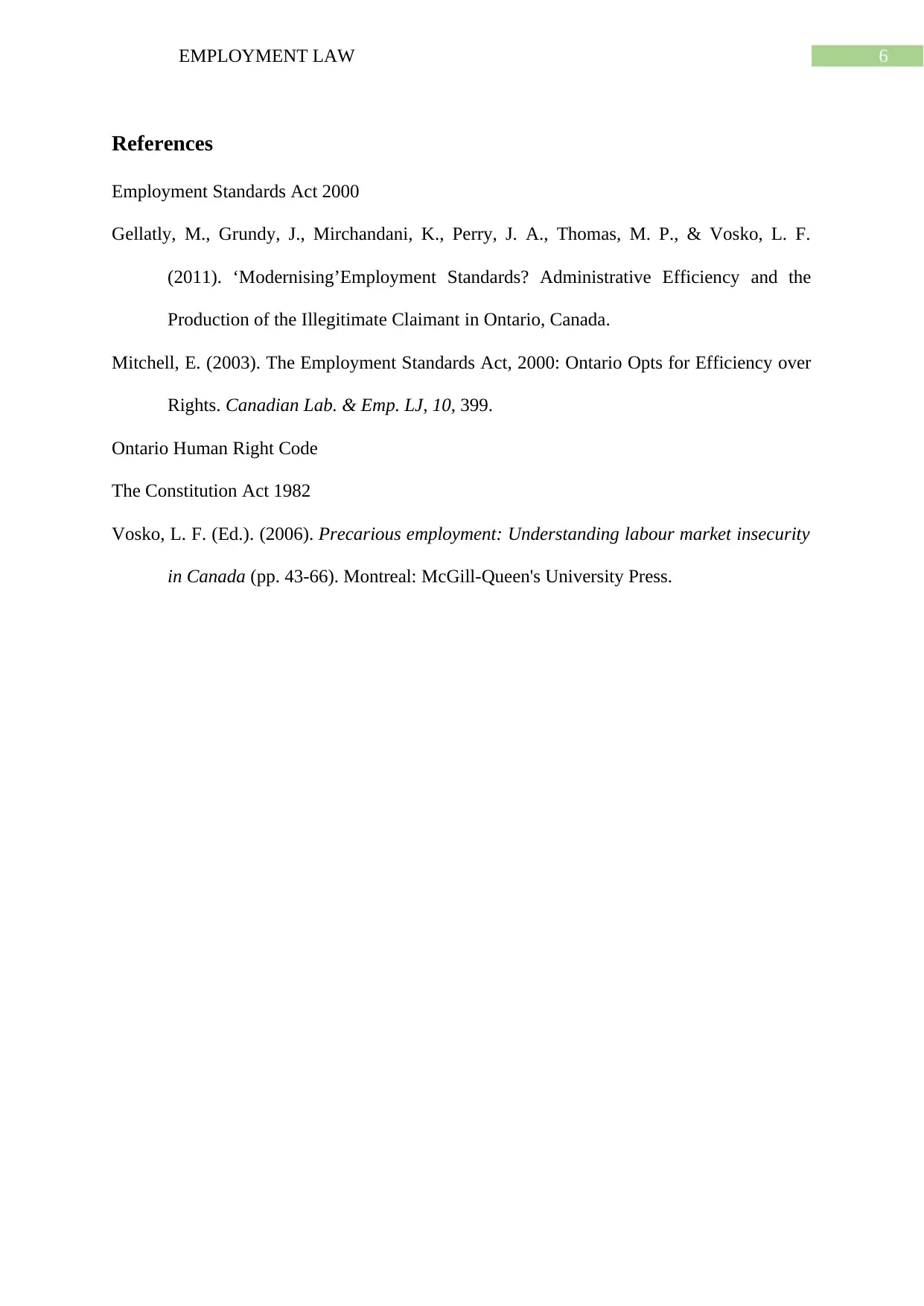
6EMPLOYMENT LAW
References
Employment Standards Act 2000
Gellatly, M., Grundy, J., Mirchandani, K., Perry, J. A., Thomas, M. P., & Vosko, L. F.
(2011). ‘Modernising’Employment Standards? Administrative Efficiency and the
Production of the Illegitimate Claimant in Ontario, Canada.
Mitchell, E. (2003). The Employment Standards Act, 2000: Ontario Opts for Efficiency over
Rights. Canadian Lab. & Emp. LJ, 10, 399.
Ontario Human Right Code
The Constitution Act 1982
Vosko, L. F. (Ed.). (2006). Precarious employment: Understanding labour market insecurity
in Canada (pp. 43-66). Montreal: McGill-Queen's University Press.
References
Employment Standards Act 2000
Gellatly, M., Grundy, J., Mirchandani, K., Perry, J. A., Thomas, M. P., & Vosko, L. F.
(2011). ‘Modernising’Employment Standards? Administrative Efficiency and the
Production of the Illegitimate Claimant in Ontario, Canada.
Mitchell, E. (2003). The Employment Standards Act, 2000: Ontario Opts for Efficiency over
Rights. Canadian Lab. & Emp. LJ, 10, 399.
Ontario Human Right Code
The Constitution Act 1982
Vosko, L. F. (Ed.). (2006). Precarious employment: Understanding labour market insecurity
in Canada (pp. 43-66). Montreal: McGill-Queen's University Press.
1 out of 7
Related Documents
Your All-in-One AI-Powered Toolkit for Academic Success.
+13062052269
info@desklib.com
Available 24*7 on WhatsApp / Email
![[object Object]](/_next/static/media/star-bottom.7253800d.svg)
Unlock your academic potential
Copyright © 2020–2026 A2Z Services. All Rights Reserved. Developed and managed by ZUCOL.





